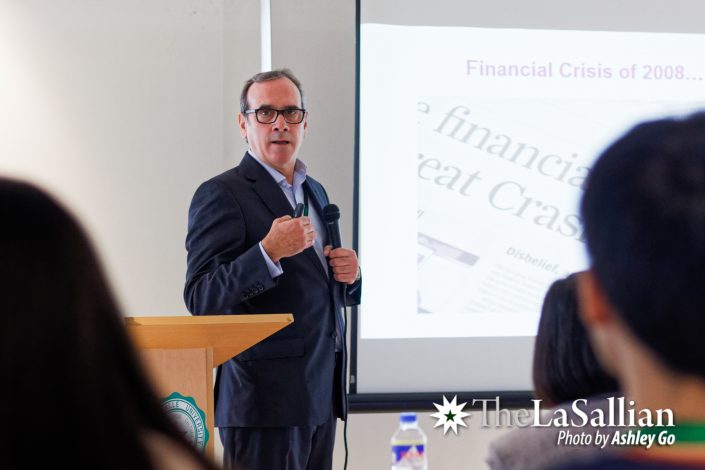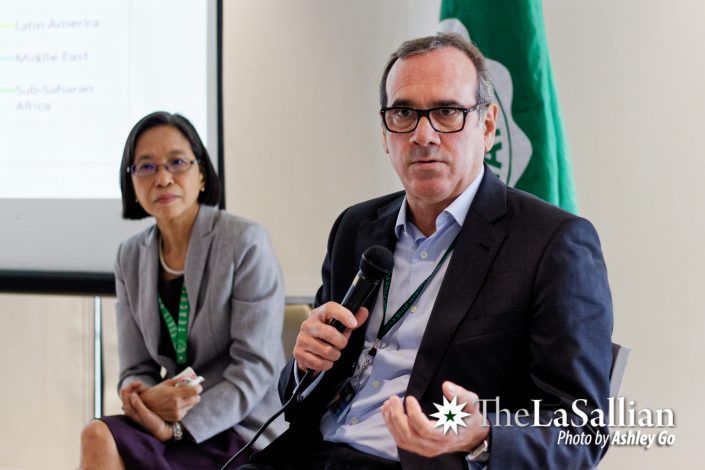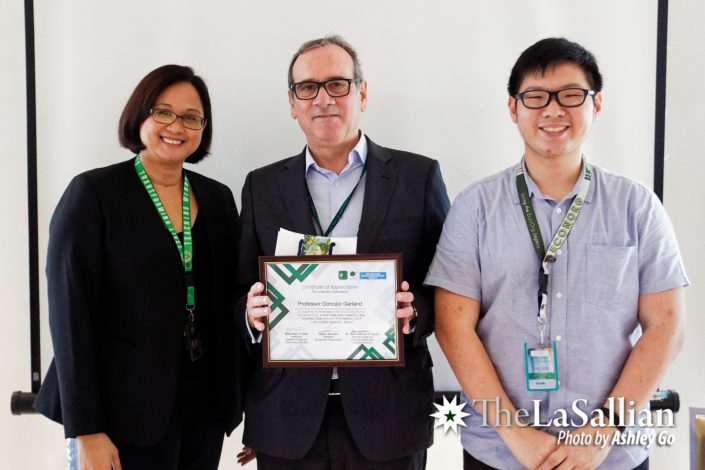“I don’t think free trade is over; I hope [it] is not over.” This was how Gonzalo Garland, an Economics professor from the IE University in Madrid, Spain, responded to the question posed by the title of his lecture, Is Free Trade Over? Towards a New World Economic Order.
Garland, who also serves as the Vice President of External Relations at the institution, gave the remark when he wrapped up his talk held at the Henry Sy Sr. Hall Roof Deck Dining Hall on October 7. There, he discussed the historical trend of economic policies and the implications of the ongoing trade war between the United States (US) and China.

Tracing history
The professor noted that free trade is not entirely new, asserting that while some may think that the present economic order marks the first time free trade exists, such is not true. Referring to a “relatively peaceful” time in history dominated by Britain known as “Pax Britannica”, he said, “That period, when you think about it, was very much a free trade period.”
Garland explained that even the Industrial Revolution, which the United Kingdom led, was motivated by the country’s interest to acquire resources without restrictions. “They were imposing free trade on the rest of the world,” he went on, describing the Opium Wars, wherein Britain “forced” China to open its ports to the opium trade, as an example.
According to him, however, this system fell apart with the outbreak of World War I and the Great Depression in the years that followed. Following these were surges in protectionism—national policies geared toward protecting local industries—across the world.
Garland remarked that free trade resurged again around the 1970s as the economic activity of Asian and Latin American countries picked up. Protectionist views returned, however, after the eruption of the 2008 financial crisis that was followed by an economic decline known as the Great Recession.

Trump and Trade
The move towards protectionism by the administration of US President Donald Trump was a key issue that Garland raised. The ongoing trade war between the US and China, in particular, is getting worse according to him. “What we’re seeing is that before April to July of 2018, [tariffs] started to go up,” he detailed.
Expounding on the Trump administration’s position, Garland stated that the US believes China’s economic growth is not necessarily due to its policies but through “manipulating their currency” and “stealing intellectual property”.
Beyond China, the US has also started imposing tariffs against other economies, Garland pointed out. He mentioned that it has announced that it would tax products coming from the European Union (EU), following a dispute filed before the World Trade Organization, wherein the American government complained against the EU’s subsidies for the aerospace company Airbus.

“I am very concerned—very concerned in terms of the trade wars for several reasons,” Garland expressed, further stating that since the significance of free trade for world growth, like in the case of technology, moving away from such a policy might be a problem.
Nonetheless, he admitted that the possibility of another world recession is difficult to know. He claimed that as the latest indicators of the US economy are getting “weaker,” an economic decline might happen sooner than the country’s 2020 presidential elections.
He, however, questioned how long the US will continue its supposed protectionism. “The main issue here is how long is that (US protectionism) [going to] last…So we know elections are coming in the US, that might change,” he posited, predicting that most people will not find protectionist policies convenient. “I think [Joe] Biden and both (sic) the Democratic Party will tend to move back to the world free trade approach,” he continued.
Garland’s lecture aimed to engage faculty and students on contemporary trade issues. It was organized by the School of Economics, the Economics Organization, the LasallIan Graduate Economics Society, and the School of Economics Government.
